Муниципальное автономное образовательное учреждение
Ильинская средняя общеобразовательная школа
имени полного кавалера ордена Славы И.И. Сидорова городского округа Домодедово
Муниципальный фестиваль научно - исследовательской и проектной деятельности
«Наука, изменяющая жизнь»
Секция: Иностранные языки.
Тема: «Vegetarianism. Meat or no meat»
Автор работы: Сафонова Анна, 8 класс
Научный руководитель: Сакаева Олимахон Абдуллоевна
Домодедово 2022
Content Page
Introduction 3
1. What is vegetarianism? 4
2. Types of vegetarianism 4
3. The history of vegetarianism 5
4. Reasons why people become vegetarians 6
5. Pros and cons of vegetarianism 6
6. The practical part 8
7. Calculation of the daily dose of protein for a vegetarian 8
8. Survey 9
9. Questionnaire analysis 9
10. Conclusion 10
11. List of used literature 11
12. Applications 12
Introduction
Project topic: "Vegetarianism"
Project objective: to find out the impact of vegetarian nutrition on the human body.
Project objectives:
* expand your professional horizons by studying the roots and consequences of vegetarian nutrition;
* to investigate the influence of vegetarian nutrition on the vital activity of the human body;
* analyze the advantages and disadvantages of vegetarian food;
* conduct a survey on the problem of vegetarianism;
* make an approximate version of a healthy vegetarian diet;
* analyze the effect of vegetarianism on the body by the content of hemoglobin in the blood;
* learn recipes for cooking vegetarian dishes;
Hypothesis: if you give up animal products, it can have a positive effect on health.
Relevance of the study
Many people believe that a vegetarian diet is one of the most beneficial for humans. It is also not news that vegetarian nutrition is associated with a reduced risk of breast, colon and rectal cancer, as well as cardiovascular diseases, from which many people suffer.
Vegetarian food is rich in fiber and certain nutrients, such as vitamin C, and in addition, it is low in fat. All this gives her advantages over the usual diet of meat and potatoes. But is it so? Do vegetarians have a health risk in the absence of animal food? This made me think and carefully approach the study of this issue.
What is vegetarianism?
Vegetarianism is a lifestyle characterized, first of all, by a diet that excludes the use of the flesh of any animals.
According to the Oxford Dictionary, the term vegetarian (vegetarian) came from the English vegetable (plant, vegetable).
The word "vegetarian" was coined in 1842 by the founders of the British Vegetarian Society. It was based on the Latin "vegetus", which means "strong, healthy, fresh, vigorous". The phrase "homo vegetus" indicates a spiritually and physically developed personality. Initially, the word "vegetarianism" meant a lifestyle that was harmonious from a philosophical and moral point of view, and not just a fruit and vegetable diet.
Holidays:
October 1 is World Vegetarianism Day.
November 1 is the International Vegan Day .
Types of vegetarianism
* Strict vegetarians (old vegetarians, vegans) exclude from the diet all products of animal origin, to which they include honey. Their diet allows the use of only fruits, vegetables, cereals, nuts and their processed products. From fats, they use olive, sunflower, palm, corn, soy oil, as well as oil from grape seeds and pumpkin. True vegetarians drink mainly herbal infusions and water, less often fruit and vegetable juices, very rarely tea and coffee. They never consume sugary drinks manufactured industrially. In general, vegetarians drink less than usual, probably because fruits and vegetables contain a lot of water, and due to limited intake of salt. Vegans use dried fruits and jam instead of sugar.
However, not all vegetarians are strict fasters.
* Lacto-vegetarians, along with plant foods, consume milk and its processed products. Most of the population of modern India belongs to this group.
* Ovo-lactovegetarians (young Vegetarians) also include eggs in the diet. And, in the opinion of nutritionists, such a diet can be attributed to healthy.
* Raw food (vegetable food without cooking);
* Lacto-ovo vegetarians (in addition to milk and products from it, eggs are also allowed). (Appendix No. 1)
The history of vegetarianism
Among the directions of non–traditional nutrition, vegetarianism is one of the oldest and most common.
We find the rejection of meat consumption already in ancient times, starting with the Pythagoreans of the VI century BC. However, the ancient Greeks generally considered vegetable food to be the main one; meat played an important role during sacrificial and festive rituals.
Modern vegetarianism originated in the West since the XVIII century in Protestant countries where there was no Christian fasting (England, USA).
In Roman Catholic countries - in France, Italy, Poland - and in Catholic German-speaking lands until the end of the XIX-beginning of the XX century, vegetarianism almost did not spread, largely due to the presence of church fasting. For example, in France, before the revolution of 1789, believers fasted for about 160 days of the church year, and then between the 1850s and 1920s, the number of fast days began to decrease, and finally, in the second half of the twentieth century, the Catholic Church practically abandoned strict fasting.
In Russia, the vegetarian movement appeared at the end of the XIX century. This was largely due to the influence of Leo Tolstoy, who in 1884 became an adherent of slaughter-free nutrition. He saw vegetarianism as the first step in the renewal of human morality. And if in the West vegetarianism was viewed as a health improvement of the body, then in Russia, due to the influence of Leo Tolstoy, vegetarianism was perceived in ethical and religious aspects. In 1901, the first vegetarian society was registered in St. Petersburg.
Reasons why people become vegetarians:
* ethical (moral) - for the sake of not causing suffering to animals;
* medical - a vegetarian diet can reduce the risk of atherosclerosis, cancer, a number of cardiovascular diseases and some diseases of the gastrointestinal tract;
* religious beliefs;
* economic - the belief that a vegetarian diet helps to save money spent on the consumption of meat products;
* ecological - the belief that raising animals has a negative impact on the environment;
* aesthetic (related to the unpleasant sensations experienced when perceiving the slaughter of animals and subsequent meat processing)
* others - the belief that plant foods are natural for humans.
Pros and cons of vegetarianism
Vegetarianism, or as this food system is often called - the "green diet", has its obvious pros and cons. And before declaring yourself a vegan, you should carefully weigh the pros and cons. After all, it is very important that the system by which we eat from day to day is comfortable for us, and not only useful or fashionable.
Advantages of vegetarianism: light food is more useful
The pros and cons of vegetarianism should be analyzed separately. Let's start with the positive side of vegetarianism. The vegetarian diet includes, as a rule: nuts, cereals, seeds, legumes, vegetables and fruits. Consequently, it is rich in fiber, folic acid and vitamin C. Vegetables and fruits provide the body with vitamins and minerals that are necessary for the normal operation of all systems. Beans and seeds are good sources of protein. Vegetables are made up of phytochemical compounds that prevent some chronic diseases. Green vegetables are rich in antioxidants. Vegetables and fruits are also suppliers of natural sugars, various useful enzymes and trace elements. Such a set of products contains a very small amount of fats, cholesterol, as well as fats with a high content of saturated fatty acids. As a result, a vegetarian diet minimizes the risk of weight gain. The advantages of vegetarianism are also that it is useful for those who practice healthy weight loss. This diet lowers cholesterol levels in the blood and eliminates the risk of developing cardiovascular problems and many other diseases. The plus of vegetarianism is also that it can protect against certain foodborne diseases.
Disadvantages of vegetarianism: where can I get the missing elements?
But there is also a flip side of the coin. Despite the fact that a vegetarian diet provides the body with all the necessary nutrients, some of them we can get in larger quantities only from meat or fish. A vegetarian diet does not fully meet the human needs for protein, calcium, vitamin B12, zinc and iron. Iron is found in the hemoglobin of the blood, in skeletal muscles, liver, spleen, bone marrow, and is part of enzymes. With a lack of iron, iron deficiency anemia occurs – a disease that is widespread in the population, not only vegetarians. The daily requirement for iron is 10-20 mg. Dried porcini mushrooms, liver and kidneys of slaughter cattle, peaches, apricots, rye, parsley, potatoes, onions, pumpkin, beets, apples, quince, pears, beans, lentils, peas, oatmeal, chicken egg, spinach are the most rich in iron. From the table (Appendix No. 2) it can be seen that 100 grams of buckwheat contains almost the same amount of iron as 100 grams of beef liver, but vegetarians need to take into account that the iron contained in animal products is absorbed much easier and more fully.
Meat is considered the main source of vitamin B12. Soy milk, regular milk and dairy products are generally rich in vitamin D. Milk, cheese, yogurt are sources of calcium. Meat is a source of protein. Phosphorus, which is present in meat, is absorbed more easily than that contained in legumes and cereals. All these nutrients are not found in large quantities in a vegetarian diet.
Vegetarianism is not recommended for bodybuilders, children and teenagers, because they need a diet rich in proteins. A diet in which there are not enough carbohydrates and proteins can lead to anemia. The disadvantage of vegetarianism is also that vegetarians often have intestinal disorders. If your diet is completely free of fat, this is bad, because a certain amount of cholesterol and fats is necessary for the development of the nervous system and the normal functioning of the body.
The practical part
Calculation of the daily dose of protein for a vegetarian
How much protein do we need per day? The Russian Health Organization provides the following data: adults need 0.7 grams per 1 kg of weight, pregnant and lactating women need to increase this dose by 20%. Children under 5 years of age - 2 gr. per kg of weight. Adolescents are recommended 1.5 grams of protein per 1 kg of weight. Therefore, the average lacto-vegetarian at my age (16 years) to provide the body with proteins, it is necessary to eat a day:
Breakfast:
| Cottage cheese - 100g. - 18g. protein. |
| Sour cream - 50 gr. - 3 gr. protein. |
| Almonds - 25 gr. - 5 gr. protein. |
| Condensed milk 25 gr– - 2 gr. protein. |
Lunch:
| Rice - 100 gr. - 8 gr. protein. |
| Peas - 50 gr. - 12 gr. protein |
| Mushrooms - 100g. - 7g. protein. |
| Cheese - 30g. - 7g. protein. |
Dinner:
| Buckwheat - 150 gr. - 18 gr. protein |
| Milk - 200 gr. - 5 gr. protein. |
|
|
In total, I got 200 grams. breakfast food, 280 gr. food for lunch, 150 gr. food for dinner and a glass of milk before going to bed. All this will bring us 85 grams of protein, which will make up for the daily norm.
Survey
We conducted a survey among the students of our school on the problem of vegetarianism. Students of grades 5-8 took part in the survey.
There are 100 people in total. (see Appendix No. 3)
Questionnaire questions.
1. Are there vegetarians among your relatives, friends and acquaintances?
a) yes; b) no; c) I find it difficult to answer.
2. Have you ever had a desire to become a vegetarian?
a) yes, it has; b) it has not occurred c) I find it difficult to answer.
3. Do you think giving up animal products is beneficial or harmful to health?
a) useful; b) harmful; c) does not affect health in any way d) I find it difficult to answer.
4. Do you think there are many or few vegetarians in our country today?
a) a lot; b) a little; c) I find it difficult to answer.
Questionnaire analysis
Purpose: to find vegetarians among schoolchildren, their relatives and acquaintances, as well as to find out their opinion about the vegetarian diet.
During the survey, it was found that the majority of respondents (74%) there are no known vegetarians and 22% of the respondents have such people
(see Appendix No. 4). When answering the question about a possible transition to a vegetarian diet, 66% could not become vegetarians, 28% could.
When answering the third question, it turned out that only 12% of students considered the rejection of animal products useful, harmful - 62%, found it difficult to answer - 19% and 7% think that it does not affect health in any way.
Conclusion
In conclusion, I would like to note that in recent years vegetarianism has literally gained worldwide popularity. Thousands of recipes for non-meat cooking are offered to us daily on television, radio, and in the press. Politicians and artists, athletes and scientists, people of literally all professions are now fond of vegetarian cuisine and find it useful for themselves. The main thing, at the same time, is to emphasize that in each case it is important to determine for yourself the necessity and expediency. Proper nutrition is not such a simple thing as it seems at first. It is necessary to take into account the energy value of products, their chemical composition, diversity, environmental safety, time and duration of meals, intervals between them. Vegetarians justify their method of nutrition based on statistical data on the absence of cancer. But the arguments of the opponents of vegetarian food are also weighty: many meat products contain a number of essential amino acids that cannot be synthesized in the body independently, and at the same time are so necessary for its vital activity.
I believe that whatever path to nutrition a person chooses, the main thing is that it is healthy and balanced.
Literature
1. Bezrukova V.S. "Pedagogy", Yekaterinburg, 1994.
2. Brang P. "Special destinies of Russian vegetarianism". An inviolable reserve №2 (46) (2006).
3. Vegetarianism // Brockhaus and Efron Encyclopedic Dictionary: In 86 volumes (82 volumes and 4 supplements). - St. Petersburg, 1890-1907.
4.Dobrynina E. "Supporters of vegetarianism in Russia is becoming less and less." Rossiyskaya Gazeta (November 20, 2013).
5.Konyshev V.A. "The current state of the old concept (vegetarianism). The issue of nutrition. 1987 No. 6.
6. Ludington E., Dale G., Gamleshko I. "Keys to health". - Zaoksky: "The Source of Life", 1993.
7. Maznev N. We are treated with berries and fruits. 40 best healers in the forest and on the site: Medicinal berries and fruits. Medicinal properties and application. - M.: ICTC LADA, LLC ID "Ripol classic", 2005. - 256 p. (series "Club 36,6", series "Herbal treatment")
8. Margolina Anna. "Vegetarianism and health". Science and Life No. 4 (2010).
9. Martynov SEE Vegetables + fruits + berries = health: Conversations pediatrician about the nutrition of children: Vol. for parents. - M.: Education, 1993.
10. Medkova I. L., Pavlova, T. N. "Alternate world", M., "inter Soya", 2000.
11. Pokrovsky, A. A., "a Conversation about food", M., Economics, 1986.
12. Tolstoy L. N. "The Way of life". - M.: "Republic", 1993.
13. Spadilov E.V. "Ideal nutrition", St. Petersburg, 2000.
14. Evenstein Z.M. "Popular dietology". M.: Enlightenment, 1990.
Appendix No. 1. Table No. 1. Directions of vegetarianism.
| Types of food allowed in various directions of vegetarianism |
| Directions of vegetarianism | Meat (including fish and seafood) | Eggs | Milk | Honey |
| Lacto-ovo-vegetarianism | No | Yes | Yes | Yes |
| Lacto-vegetarianism | No | No | Yes | Yes |
| Ovo-vegetarianism | No | Yes | No | Yes |
| Veganism | No | No | No | Not always |
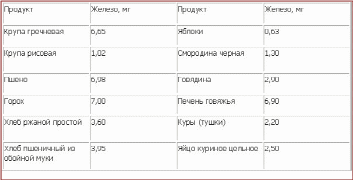 Appendix No. 2. Table No. 2. Iron content in some food products (per 100 g of edible part).
Appendix No. 2. Table No. 2. Iron content in some food products (per 100 g of edible part).
Appendix No. 3. Questionnaire of schoolchildren.

A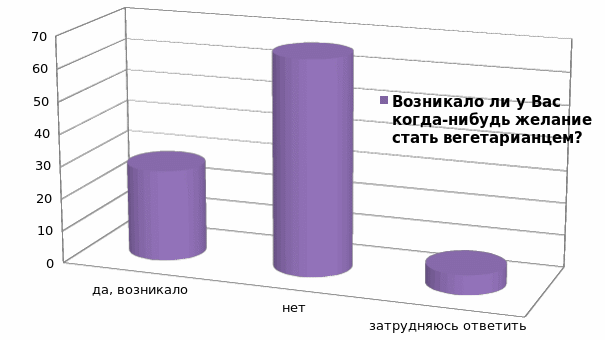
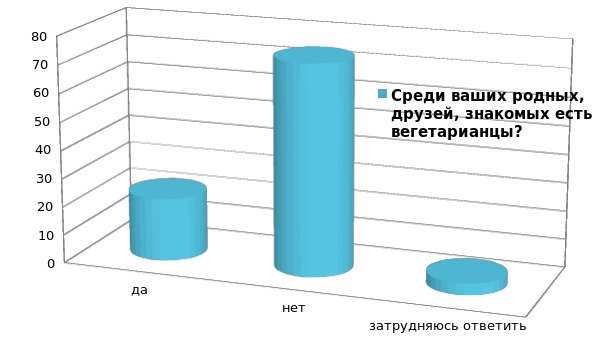 ppendix No. 4. The results of the survey.
ppendix No. 4. The results of the survey.
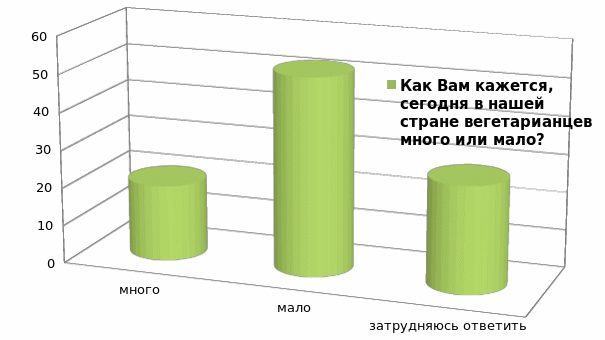
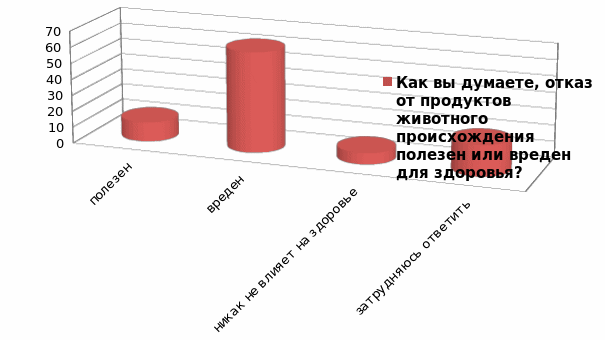







 Appendix No. 2. Table No. 2. Iron content in some food products (per 100 g of edible part).
Appendix No. 2. Table No. 2. Iron content in some food products (per 100 g of edible part).


 ppendix No. 4. The results of the survey.
ppendix No. 4. The results of the survey.











